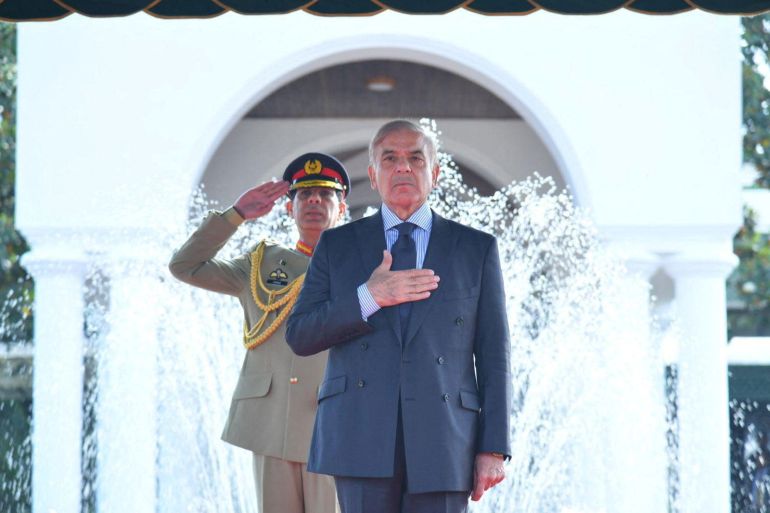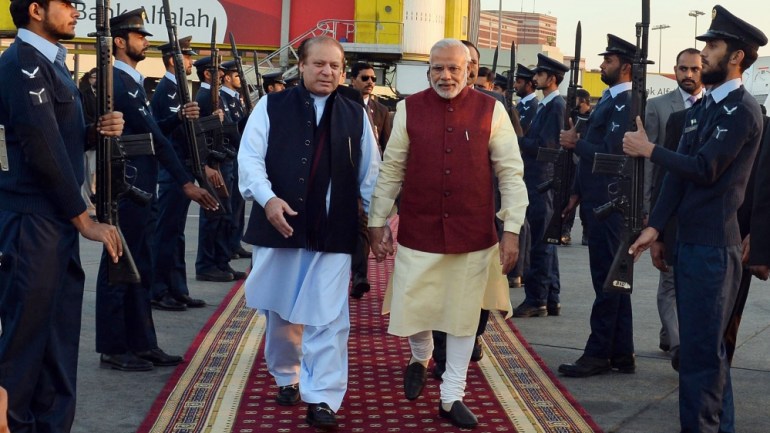PM Sharif: Peaceful settlement of Kashmir dispute ‘indispensable’
Pakistan’s new PM Shehbaz Sharif tells his Indian counterpart he wants a ‘peaceful settlement of outstanding disputes’.

Pakistan’s new Prime Minister Shehbaz Sharif says a “peaceful” settlement of the Kashmir dispute with neighbouring India is “indispensable”.
Thanking his Indian counterpart Narendra Modi for his good wishes on his election as premier, Sharif on Tuesday said Islamabad “desires peaceful and cooperative ties” with India, sparking hopes that his election could provide a fresh chance for a diplomatic thaw between the two nuclear-armed neighbours.
Keep reading
list of 4 itemsIndia rebukes China FM over Kashmir remarks before expected visit
Kashmir Files, hailed by Modi, triggers anti-Muslim hate speech
Kashmir men spend over 100 days in jail for cheering Pakistan win
“Thank you Premier Narendra Modi for felicitations. Pakistan desires peaceful and cooperative ties with India. Peaceful settlement of outstanding disputes including Jammu and Kashmir is indispensable,” Sharif, who was elected Pakistan’s 23rd prime minister on Monday after Imran Khan lost a no-confidence vote in parliament, posted on Twitter.
“Pakistan’s sacrifices in fighting terrorism are well-known. Let’s secure peace and focus on the socio-economic development of our people,” he added.
Thank you Premier Narendra Modi for felicitations. Pakistan desires peaceful & cooperative ties with India. Peaceful settlement of outstanding disputes including Jammu & Kashmir is indispensable. Pakistan's sacrifices in fighting terrorism are well-known. Let's secure peace and.. https://t.co/0M1wxhhvjV
— Shehbaz Sharif (@CMShehbaz) April 12, 2022
The Himalayan region of Kashmir has been a bone of contention between the two nuclear rivals since 1947, following the end of British colonial rule in the subcontinent.
The picturesque valley is held by Pakistan and India in parts but claimed by both in full. A small sliver of Kashmir is also held by China.
Since they were partitioned in 1947, the two countries have fought three full-scale wars – in 1948, 1965 and 1971 – two of them over Kashmir.
Separatist groups in Indian-administered Kashmir have been fighting against Indian rule for independence or unification with neighbouring Pakistan.
According to several human rights organisations, thousands of people have reportedly been killed in conflict in the region since an armed rebellion against New Delhi began in 1989.
Tensions have intensified since August 2019 when Modi’s government stripped Indian-administered Kashmir of its special autonomous status, a move that angered Pakistan.
Reactions to Sharif’s statement
Pro-India political parties in Indian-administered Kashmir say they have always been in support of dialogue between India and Pakistan to resolve the Kashmir issue.
“The National Conference has always been a votary of dialogue between India and Pakistan. We would be the last to reject it,” Imran Nabi Dar, spokesman for the region’s oldest political party, told Al Jazeera.
“It is the Kashmiris who are suffering because of the hostilities between the two countries. We would love both the countries to sit down and resolve all their issues including Kashmir.”
However, Siddiq Wahid, academician and political analyst based in the region, thinks Sharif’s statement is “more of a routine ritual from Islamabad”.
“I regard the purported demand of the new Sharif in Pakistan for a ‘peaceful resolution of Kashmir’ at this point as more of a routine ritual from Islamabad. That is because it is difficult to imagine New Delhi talking to a caretaker government in Islamabad which stands on stilts until an election takes place,” he said.
But Pravin Sawhney, a defence expert and editor of Force magazine, said India should react positively to the Pakistani leader’s statement.
“India should want to start talks. There should be some sort of peace. The diplomatic relations should be normalised… I see both sides are keen and talks should start,” he told Al Jazeera.
Sharifs seen as close to New Delhi
Sharif’s older brother Nawaz Sharif, who was elected Pakistan’s prime minister thrice, had sought to build economic and trade ties, and improve overall relations.
In 2014, in a rare gesture of peace between the two nations, Nawaz Sharif as prime minister had travelled to New Delhi for Modi’s oath-taking ceremony.
And for his part, the Hindu nationalist leader made a surprise trip to Pakistan a year after taking office, to attend a Sharif family wedding.

The Sharifs belong to an elite political family seen in India as conciliatory towards New Delhi and willing to settle disputes with dialogue – unlike Imran Khan, the immediate predecessor.
During Khan’s government, diplomatic relations were downgraded and direct trade suspended after a dispute over India’s 2019 move in Indian-administered Kashmir.
Khan had also been critical of Modi and his Hindu-nationalist ideology, and had called for international action to stop calls for the genocide of Muslims made by India’s Hindu groups.
The continuing silence of Modi govt on the call at an extremist Hindutva summit in Dec for genocide of minorities in India, especially the 200 mn Muslim community, begs the question whether the BJP govt supports this call. It is high time international community took note & acted
— Imran Khan (@ImranKhanPTI) January 10, 2022
The Sharif siblings have usually had “cordial relationships” with Indian leaders, said Imtiaz Gul of the Center for Research and Security Studies in Islamabad.
“This is a good entry point basically for India to resume dialogue,” he added.
Unusual for a senior Pakistani politician, Shehbaz Sharif visited India in 2013 as chief minister for Punjab – a state that was split between the two nations in the bloody partition of 1947.
Sharif visited his family’s ancestral village on the Indian side of the frontier and met with then-Prime Minister Manmohan Singh in New Delhi, along with other officials.
With Sharif now in office, analysts say Pakistan’s new leader will herald a diplomatic thaw between the two arch foes after years of tensions.
“He is not someone who will go to the extreme of antagonising India,” said Ajay Darshan Behera, professor of international studies at New Delhi’s Jamia Milia Islamia university.